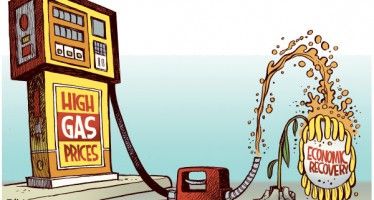Arnold Was The Machiavellian Governor
JAN. 5, 2011
By WAYNE LUSVARDI
The media commentariat have tried to compare new California Gov. Jerry Brown with outgoing Gov. Arnold Schwarzenegger, but the kind of leader it takes to manage under different economic circumstances makes for a difficult comparison.
During economic booms it is easier to rule by love and surfeit, and during financial busts it is necessary to rule by fear of the budget cut. But leadership in California means more than being hated by Republicans and Independents and loved by Democrats.
Legitimate rule
Brown comes into office partly based on his family name but mainly on his abilities as former two-term governor and attorney general. Schwarzenegger came into office on the fluke of a recall election based on his charismatic prowess, money, his wife’s family name, but with no proven track record and thus less legitimacy. A state assumed by one’s own natural skills and experience during an economic contraction is much less difficult to maintain control over than one based on mainly good fortune during an economic bubble and an out-of-control state spending binge.
The 15th century political thinker Niccolo Machiavelli wrote in his classic book The Prince: “A private citizen who becomes a ruler out of sheer good luck needn’t make much effort to take his state but will have to sweat it if he is to hold on to it.” Machiavelli mentions examples of luck such as being appointed to office, buying an office with money (Meg Whitman), or rising to power by bribing the army.
Arnold came into office by luck of a recall election. After being elected and his bundle of ballot reform propositions failed, Arnold tried to win over his prison guard army with lucrative pay and pension benefit plans with disastrous budgetary consequences. By contrast, Brown is promising to return the funding of government services back to the local level. Most notably the expensive state prison system is going to have to divert prisoners back to cheaper county jails to avoid continuing to dig deep budget holes. But will Brown stand up against his army of unionized prison guards and risk becoming as feckless as Arnold after his package of reform initiatives failed?
Circumstances and necessity
Schwarzenegger came into office facing a hostile Legislature after a state-created energy bubble followed by a real estate bubble. Brown comes into office in a period of bubble deflation with supposedly a more cooperative Legislature. In other words, the circumstances that each governor inherited are exactly opposite. One inherited a bubble economy, the other a troubled economy; one a hostile legislature the other supposedly a more facile legislature. But the budget deficit realities have only grown larger.
Collapse the boxes
It was as if the union-dominated Legislature and the bureaucracies were trying to bust the budget under Schwarzenegger, while under Brown the early signal is the state budget is going to be readjusted downward; and in the case of some agencies, such as redevelopment, possibly reduced to moonbeam dust.
In November 2010, the voters passed Prop. 22 to prevent the state from raiding local redevelopment property taxes for schools. Nonetheless, Brown stated he would de-authorize redevelopment agencies statewide. Redevelopment is a luxury in a state that is broke and in which little new development is viable. Arnold may get the last laugh as he always wanted to “blow up the boxes” of the state’s luxury bureaucracies and commissions.
Energy and environmental wars
Arnold Schwarzenegger came into office on a recall election after the abject failure of former Gov. Gray Davis and the state Legislature to manage the California Energy Crisis of 2001 when they enacted price controls resulting in an induced electricity price bubble. Neither then-Gov. Davis nor new Gov. Schwarzenegger told the public that the energy crisis was set into motion by the EPA mandating clean air regulations on California at the threat of cutting off federal funds for highways and schools. This resulted in the disastrous mothballing of old, polluting power plants whose bonds weren’t paid off. Once elected, Schwarzenegger folded the unpaid debts on the decommissioned power plants into a $42 billion bond to be paid back by long-term power contracts set to expire in 2012.
In 2001, California was running out of clean sky, not energy per se. In 2010, California is once again running out of clean air and is hurrying to build expensive in-state green power plants and a cap-and-trade pollution credit program. But the air will be cleaner in Utah, Nevada or Arizona where California’s imported dirty power comes from, not in the smog basins of California’s cities. Again quoting Machiavelli: “Like anything that appears suddenly and grows fast, regimes that come out of nothing inevitably have shallow roots and will tend to crash in the first storm.”
Thus, in November 2010 California voters indicated they wanted green power (No on Prop 23 to suspend green power) but weren’t told they could end up facing another “perfect energy storm.” It looks like Brown will risk turning the mid section of the good ship California directly into the impending energy storm, just as he risked building geothermal power plants that failed during his last administration in 1979. Southern California water rate payers ended up paying off a quarter of a billion dollars in bonds on the mothballed Bottle Rock geothermal plant planned by Brown. Today, the Bottle Rock plant has re-opened and sells electricity to Northern California cities subsidized by Southern California water ratepayers.
With the luxury ocean liner of California already leaking water into its bilge, it remains to be seen if the ship will capsize. The ship is unlikely to sink into default but it may list to one side while being towed by tugboats. Another future energy crisis might drive many immigrants out of the state and reverse globalization may occur. Former Gov. Pete Wilson and Prop. 187 may be vindicated if such an event transpires. Jerry Brown could risk being hated if he raises electricity bills on the backs of the poor and economic migrants.
Unintended consequences
In 2006, Schwarzenegger pushed through Assembly Bill 32 – the Global Warming Solutions Act – to capture the revenue premiums from long-term power contracts for green power. The roll out of AB32 by 2012 may backfire on California because the Obama administration plans to socialize the regional power grid and bust open the green energy cartel that California had hoped would reduce the state budge deficit.
Thus, the result of AB32 may not be less but greater dependence on imported power from other states – only it will be expensive green power not cheap coal power. As Machiavelli warned when referring to the regime of Cesare Borgia: “If his efforts came to nothing, it was not due to his own shortcomings, but to an extraordinary run of bad luck.” And bad luck it will be if Schwarzenegger’s legacy is greater dependence on imported power.
Water wars
Schwarzenegger’s management of the so-called drought by declaring a statewide emergency in 2008 after only two years of normal light rainfall and snowpack was an example of bureaucratic capture. The drought required higher water rates in Southern California due to water conservation required as a result of a court shutting off water to farms and cities to protect a tiny fish. The court was hoodwinked by bogus science and later rescinded its water shut down order.
Water agencies in Southern California no longer enforce their water conservation ordinances but have not repealed their water rate hikes, arousing suspicions that the whole drought was fishy. Paraphrasing the new governor’s inaugural speech, Brown will have to discern a “problem” from a “condition,” and a contrived drought is not a condition of nature.
Schwarzenegger should have learned from the Klamath River Conflict in 2001 in Oregon where this trick of using a bogus environmental lawsuit to raise water rates and grab land and water rights from farmers was previously pulled off. Paraphrasing a classic proverb in the public water business: “Even when the water is shut off, water flows up hill toward money.”
Brown has wisely cleaned house of all the major department heads, including Lester Snow of the Department of Water Resources. It will be more difficult for Brown to succumb to bureaucratic and legal capture on the drought issue now that the meteorological gods have already dumped double the normal snowpack in the Sierra Nevada Mountains for this time of year.
Brown has not mentioned if he will freeze the $4.1 billion of unspent funds from prior water bonds, which have mainly funded greenbelt projects around wealthy residential enclaves. Neither has he mentioned whether he will endorse the proposed $31 billion Consolidated Water Bond (including interest and matching fund mandates) on the upcoming 2012 ballot given that it is full of political pork and questionable projects, but no Peripheral Canal. If the economy doesn’t improve fast, the new bloated water bond has a snowball’s chance in Death Valley of passing.
Culture wars
Marriage and family law has historically been used to reinforce what is politically important. Schwarzenegger’s handling of the cultural and legal crisis of Prop 8, the Protect Marriage Act, was a failure of cultural leadership.
Machiavelli described how in the 15th century Pope Alexander VI did a favor for French King Louis by dissolving his first marriage in return for French military assistance against those who opposed papal expansionism and the appointment of his son, Cesare Borgia, as a powerful duke. The pope wanted to give church land away to expand his son’s power. But the French ended up abandoning Borgia on the battlefield and went back home and “he (Borgia) decided never to rely on other people’s armies and authority again” (Machiavelli).
In 2008, Schwarzenegger faced a cultural crisis not of his making but originating with the shortsightedness of the state Supreme Court, the modern day version of a secular papacy. Prop. 8 sought to limit the legal definition of marriage to a man and a woman. Prop. 8 passed despite opposition from Gov. Schwarzenegger. A judge eventually struck down the gay marriage ban. Both governors Schwarzenegger and Brown have refused to appeal Prop. 8, thus its overturning by the 9th Circuit appeals court may stand. Prop. 8 is on an eventual track to be heard by the U.S. Supreme Court.
Neither the courts, religious groups, or Gov. Schwarzenegger were able to serve as a cultural mediator of this conflict and it is unlikely that Jerry Brown will be either, despite his priestly image and past Jesuit training. California can’t find a middle ground on cultural or budgetary issues because of its polarized social classes and political gerrymandering.
Loved or feared?
Machiavelli’s following advice in his book The Prince may be helpful in defining both leadership and public policy in California:
“Is it better to be loved than feared, or vice versa? The answer is that one would prefer to be both but, since they don’t go together easily, if you have to choose, it’s much safer to be feared than loved….Men are less worried about letting down someone who has made himself loved than someone who makes himself feared. Love binds when someone recognizes he should be grateful to you, but, since men are a sad lot, gratitude is forgotten the moment it’s inconvenient. Fear means fear of punishment, and that’s something people don’t forget.”
“All the same, while a ruler can’t expect to inspire love when making himself feared, he must avoid arousing hatred…And a ruler won’t be hated if he keeps his hands off his subject’s property. Above all, he mustn’t seize other people’s property. A man will sooner forget the death of his father than the loss of his inheritance.” (Niccolo Machiavelli, The Prince, translated by Tim Parks, 2009).
Former Gov. Schwarzenegger wanted to be loved and he ended up being disrespected. New Gov. Brown must find a way to be more than loved by Democrats and hated by Republicans and independents. He must find a way to be feared but not hated. And to do that he must keep his hands off people’s property, whether in the Sacramento Delta, a proposed split commercial-residential tax roll under Prop 13, farmer’s water rights or environmental regulatory takings.
Unfortunately, public pension benefits have been enshrined into the status of private property. If there is any place to start with plugging the deep hole in the state budget deficit and the disaster it portends for local governments, it will be with public pension reform and union concessions. New Gov. Brown will be probably be judged on this issue more than all others.
Related Articles
‘You don’t get free things’ Filner unlikely to quit
A source close to Filner tells me rumors that he will resign today are untrue. — Craig Gustafson (@gustafsoncraig) August
Dems stop bills to ease gas price hike
Perhaps the last chance to head off a California gasoline price hike that could exceed 50 cents per gallon
Trump surges in key CA primary
Fulfilling analysts’ growing expectations and leaving some Golden Staters in disbelief, California has emerged as perhaps the most decisive contest




